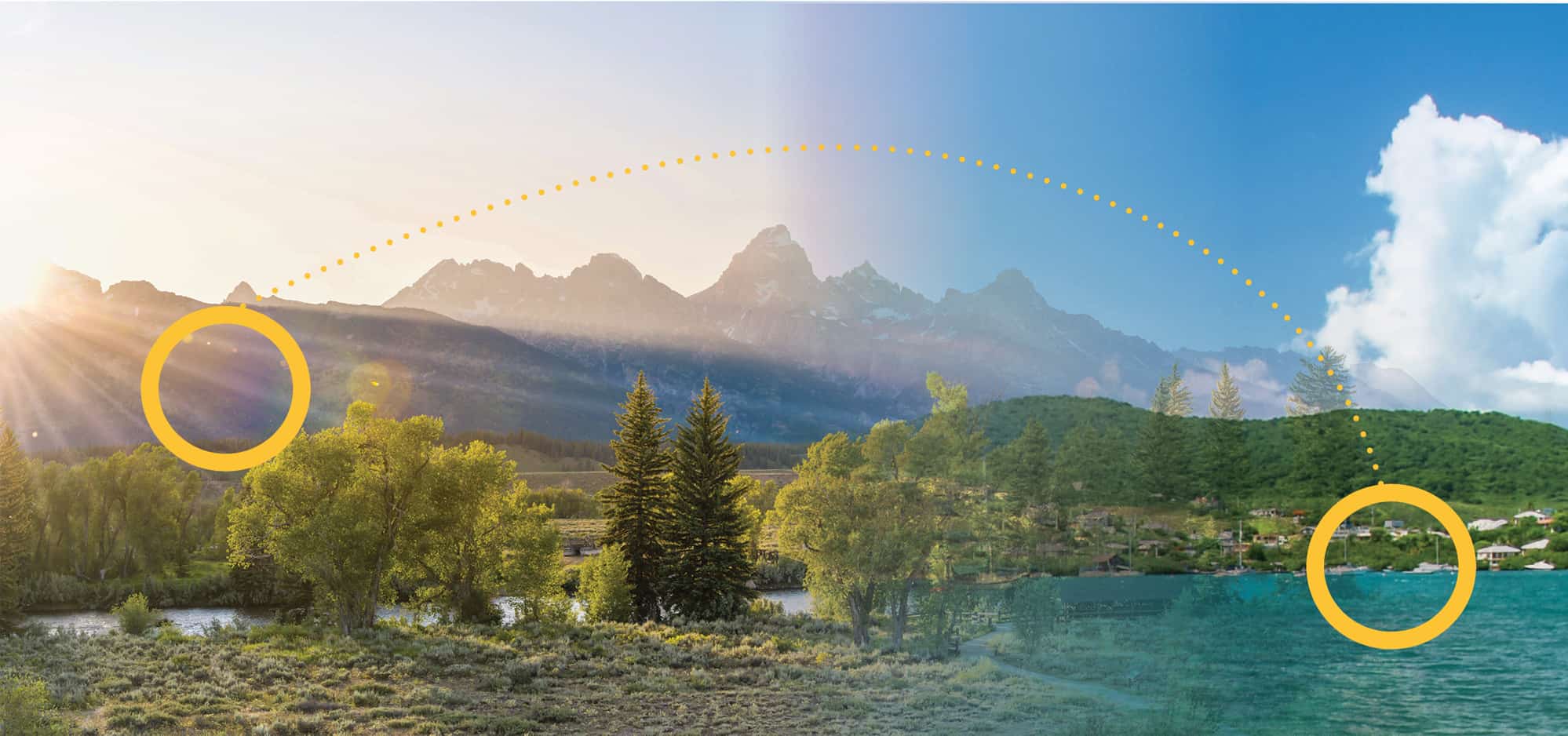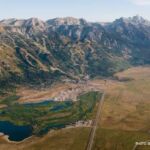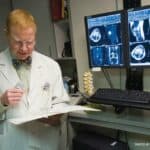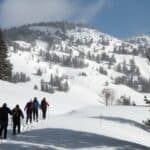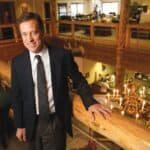Read The
Current Issue
English version follows
Vaqueros del Caribe
Una depresión económica y desastres naturales han provocado que más de 400,000 puertorriqueños abandonen su hogar en la isla caribeña desde el 2017. Algunos están creando nuevas vidas en Jackson Hole.
Escrito por Lina Collado García
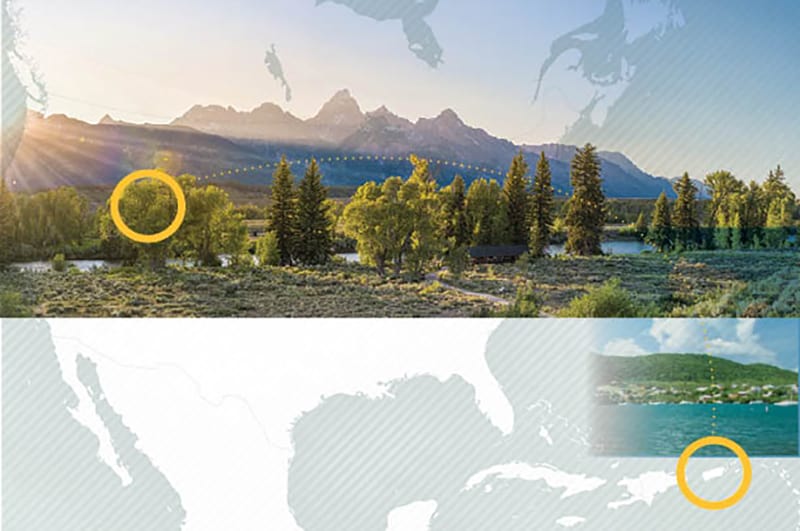
En PUERTO RICO—un archipiélago en el noreste del Mar Caribe, a unas 1,000 millas al sureste de Miami, Florida, la expresión “puntas blancas” se refiere al mar en lugar de a los picos de las montañas. En lugar de que te pregunten “¿esquías?” es “¿surfeas?” El Estado Libre Asociado de Puerto Rico, un territorio de EE.UU desde 1899, tiene más de 143 islas, cayos, islotes y atolones; hoy solo tres están habitadas: Puerto Rico, Vieques y Culebra. Cuando Cristóbal Colón llegó a Puerto Rico en 1493, los indígenas taínos vivían en las 143 islas, además de las islas vecinas, incluidas Jamaica, Cuba y la República Dominicana. A fines del siglo XVI, los taínos habían sucumbido lentamente a las enfermedades infecciosas traídas por los europeos, la explotación por parte de los colonos españoles (Puerto Rico era una parte clave del Imperio español en los siglos XV y XVI) y la guerra. Sin embargo, los taínos no se erradicaron por completo: un estudio del 2011, basado en personas nacidas en la isla, encontró que, en promedio, un puertorriqueño tiene un 15 por ciento de sangre taína, un 21 por ciento sangre africana y aproximadamente un 64 por ciento de herencia europea.
El español es la lengua oficial de Puerto Rico; San Juan su capital; y salsa su música. La población del Estado Libre Asociado, 2.8 millones, es aproximadamente cinco veces mayor que la de Wyoming. Si la densidad de población de Puerto Rico se clasifica junto con la de los cincuenta estados de los EE.UU., estaría entre los primeros 5. Wyoming ocupa el puesto 49 en esta lista. La temperatura promedio anual de la isla es casi cuarenta grados más cálido que la de Jackson Hole y la elevación promedio es unos 5.500 pies más bajo. La isla principal es solo un 20 por ciento más grande en tierra que el condado de Teton. La bandera del estado de Wyoming presenta un bisonte. La mayoría de los puertorriqueños diría que el animal que mejor simboliza sus islas es una pequeña rana llamada coquí, varias de las cuales son endémicas.
La distancia y las diferencias entre Jackson Hole y Puerto Rico explican por qué, tan recientemente como en el año 2013, solo había cinco puertorriqueños viviendo en Jackson Hole, Wyoming y Teton Valley, Idaho combinados. (Y solo 33 puertorriqueños en todo Wyoming, según el Centro de Estudios Puertorriqueños en el Hunter College de Nueva York). En el 2016, cuando la deuda de la isla era de más de $70 mil millones y la economía cayó aún más en una recesión comparado con la que había estado en la década anterior, causando que alrededor de 7.500 personas se fueran de la isla cada mes. Luego vinieron los huracanes Irma y María. Entre el 2017, cuando golpearon los huracanes, y el 2019, se estima que el 14 por ciento de la población de Puerto Rico, alrededor de 470,335 personas, se fue a la parte continental de los EE.UU.
Los puertorriqueños son tan libres de mudarse a Wyoming como cualquier otro ciudadano de los EE.UU., pero los que salen de las islas se unen a amigos o familiares en la diáspora concentrados principalmente en la costa este. Hasta hace poco, más de 200 puertorriqueños ahora llaman hogar al condado de Teton de acuerdo con la Agencia Federal para el Manejo de Emergencias (FEMA).
El cambio que los isleños podrían sentir al llegar a Jackson Hole se ve parcialmente mitigado por la gran población hispanohablante de la zona: alrededor del 25 por ciento de la población de la ciudad de Jackson es hispana, y la mayor parte proviene de México. Aún así, hay diferencias geográficas, geológicas, meteorológicas y culturales con las que lidiar. “Acostumbrarse a tener que usar tanta ropa durante el invierno, no ver el sol a veces durante tres días seguidos o no poder bailar salsa en cualquier lugar de la ciudad, excepto en un bar, una vez a la semana, tomó determinación”, dice Teresa Rivera, quien se mudó a Jackson en el 2017, “pero lo estoy haciendo funcionar”. Conozca a algunos de los puertorriqueños que están creando nuevos hogares y nuevas vidas para sí mismos en un paisaje que es casi tan diferente del de su tierra natal como el de la luna.
Para continuar leyendo sobre estos perfiles Puertorriqueños en español, porfavor visite la página web de la revista, www.jhmagazine.com.
La Familia Klein, Andy, 41, Nastassia Cruz, 34, Michael “Mickey,” 11, y Odie, 6
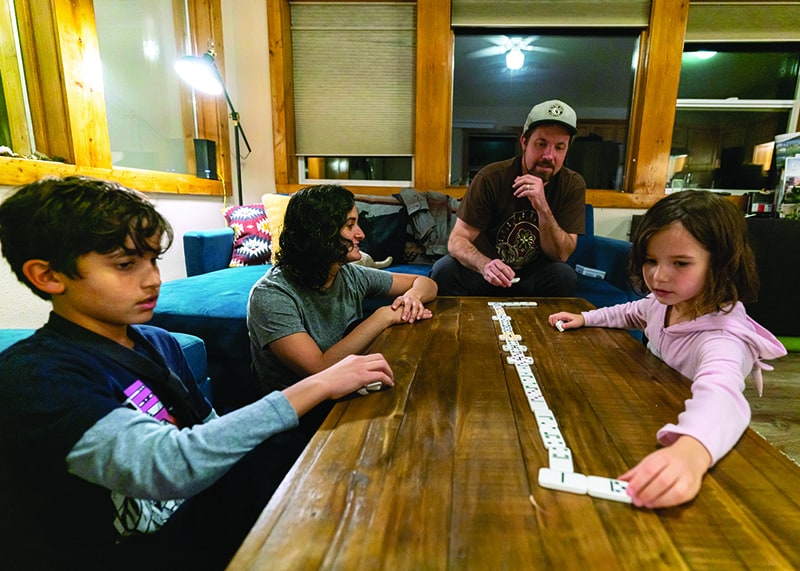
NASTASSIA CRUZ ERA recién graduada de la escuela secundaria y vivía con su familia en su ciudad natal de Aguadilla cuando conoció a Andy Klein, un atlético y amante de la naturaleza que recientemente se había mudado a Puerto Rico de Jackson Hole. Klein hablaba español con fluidez y le encantaba cocinar. Con el tiempo, él y Cruz se involucraron. Unos años más tarde, abrieron un exitoso restaurante tailandés en Aguadilla llamado One Ten Thai. Tuvieron un hijo, Mickey, en el 2008, y se casaron en el 2012. Celebraron su matrimonio durante un mes con fiestas en Jackson Hole y Puerto Rico. Para ese momento, Cruz ya había estado en Jackson varias veces con Klein y “sintió una conexión con este hermoso lugar”. Se casaron en Flat Creek Ranch.
En la primavera del 2017, los Klein tomaron lo que describen como una “decisión fácil” en la cual los cuatro, incluyendo su hija Odie quien nació en el 2014, pasarían un verano entero en Jackson. Regresarían a Puerto Rico y a su restaurante, One Ten Thai en octubre. Pero el huracán María azotó la isla en septiembre. En dos semanas luego del huracán se dieron cuenta de que había poco para regresar a casa. La familia consideró California, Colorado y Jackson antes de decidir probar un invierno en Jackson. “Queríamos que nuestros hijos aprendieran a esquiar y encontrar vivienda”, dice Klein. Encontrar vivienda fue más difícil que hacer que los niños esquiaran, pero no por mucho. Al final del invierno, se habían mudado tres veces y solo pudieron esquiar gracias a organizaciones locales sin fines de lucro como Teton Literacy Center y Coombs Outdoors. “Incluso si nuestra decisión de quedarnos en Jackson se sintió fácil, la experiencia de quedarnos en Jackson se nos hizo muy difícil”, dice Klein. “Constantemente teníamos que mantener la cabeza alta para mostrarles a los niños que lo estábamos logrando, pero en realidad, estábamos pasando por un momento muy difícil”. También Odie, que no podía entender por qué se mudaban tanto y vivían con extraños cuando tenían una casa en Puerto Rico. “Todos los días durante cuatro meses, [ella] preguntó cuándo íbamos a volver a casa”, dice Klein.
La luz brillante fue cuánto Mickey amaba a Wilson Elementary School. Después de su primer día de clases, vino y anunció que quería graduarse de la escuela primaria allí. En realidad, fueron Mickey y Wilson Elementary quienes mantuvieron a la familia aquí. Cruz y Klein dicen que, durante sus primeros años en el valle, lamentaron “muchas veces” la decisión de quedarse, pero lo que evitó que se fueran fue ver a Mickey prosperar y amar a su escuela.
El esquí ha reemplazado al “snorkeling” como la actividad de invierno favorita de los niños y Klein está de vuelta en la cocina de un restaurante, como chef ejecutivo en The Whistling Grizzly, que se encuentra dentro del Wyoming Inn. Allí Klein ha creado un menú de “cocina vaquera con inspiración latina” que incluye mofongo (puré de plátanos verdes, verduras, arroz y frijoles y ensalada de repollo), trucha a la plancha (trucha roja de Idaho a la plancha con salsa de berenjena española) servido en una cama de quinoa y verduras) y la kabocha rellena (calabaza kabocha asada rellena de quinoa, champiñones y tomate asado, pepitas y romesco). Al hacer esto, Klein ha creado un lugar de reunión para los puertorriqueños del valle, y un lugar donde los locales y visitantes que no saben mucho sobre la cultura de este territorio de los EE. UU tengan la oportunidad para probarlo literalmente.
David Figueroa, 56

FUE SU GUITARRA la que hizo que David Figueroa sintiera por primera vez que Jackson Hole era su hogar. “Durante el verano, toco la guitarra todos los días en mi tiempo libre con la puerta de entrada abierta para conocer a mis nuevos vecinos y mi nueva comunidad”, dice Figueroa, quien se mudó al valle en diciembre de 2015 y vive en la vivienda laboral de Albertson. “He conocido a personas de todo el mundo que están comenzando de nuevo en un mundo muy diferente al suyo, como yo”.
En Puerto Rico, Figueroa vivió en San Juan y hacía un viaje de una hora a sus lugares de pesca favoritos en las montañas cada dos semanas. Debido a que su trabajo de entregar suministros de limpieza y cocina a los supermercados de la isla no era constante, cuando Figueroa vio un anuncio en El Nuevo Día, el periódico más grande del territorio, para un trabajo en la industria de servicios con una cantidad de horas cada semana y vivienda en Jackson Hole, decidió solicitar. Él dice que nunca imaginó que encontraría la comunidad que ha encontrado aquí. Esperaba el estilo de vida al aire libre del valle, pero nunca había oído hablar del Parque Nacional Grand Tetón y solo conocía de Yellowstone a través de Yogi Bear y una película documental.
El septiembre pasado, usando su único día libre de sus dos trabajos, como carnicero y empleado en la tienda de delicatessen de Albertson y como servidor en Whistling Grizzly, Figueroa visitó Yellowstone por primera vez. “Me dejó alucinado”, dice, incluso cuando no vio un oso, que durante mucho tiempo ha sido un sueño para él. Más a menudo, Figueroa usa su día libre para pescar en el lago Jackson. “Me mudé a Jackson Hole por las muchas oportunidades de trabajo, para poder enviar dinero a casa y ahorrar, y tener mejores opciones para mí”, dice. “He encontrado muchos otros beneficios: aquí pesco, me siento uno con la naturaleza y puedo estar presente en el momento. Muchas personas fuera de Jackson no entienden [la importancia de la naturaleza y estar afuera], pero no me importa. Es mi terapia y mi forma de hacer frente a lo que me falta en casa ”, dice. Y también una forma de hacer frente al racismo.
Un día, trabajando en la tienda de delicatessen de Albertsons, un cliente le dijo a Figueroa: “Necesitas aprender inglés si vas a vivir en este país”. Si yo fuera tú, volvería de donde vinistes. Figueroa, quien califica su inglés como un 8 en una escala del 1 al 10, respondió que había sido ciudadano estadounidense desde su nacimiento. También le mostró al cliente una de sus posesiones más preciadas, que ese día tenía en su billetera: el certificado de veterano de su difunto padre. Ladislao Figueroa recibió un Corazón Púrpura en Vietnam. “Me hizo sentir enojado y frustrado porque el estadounidense promedio no entiende nada sobre Puerto Rico o los puertorriqueños, y esa es mi realidad constante”, dice. Aún así, “no me iría de Jackson. [Aquí] todos entienden un paseo por la naturaleza, una caña de pescar o un buen juego de béisbol. Este pueblo es una mezcla de todas las culturas que me puedo imaginar. Me encanta eso “.
Teresa Rivera, 48

Teresa Rivera se mudó a Jackson en 2017. Es gerente de la tienda Dollar Store donde dice que siempre estaba “hablando con los clientes sobre Puerto Rico y sobre su increíble cocina. Los clientes sintieron tanta curiosidad que comencé a hacer todo lo que amaba y se lo di a todos los que estaban interesados en probarlo ”. Su coquito puertorriqueño tradicional fue el gran éxito y Rivera ahora recibe más de 30 órdenes durante la temporada de navidad, de locales de todos los orígenes.
TERESA RIVERA TUVO una entrada difícil para vivir en Jackson Hole por cualquier estándar. La única vivienda que pudo encontrar en un momento fue un apartamento de dos dormitorios y un baño de 600 pies cuadrados. Lo compartió con dos compañeros de cuarto pero, durante varios meses, vivieron hasta cinco personas. Fue una “pesadilla”, dice ella. Rivera pasaba todo su tiempo en su habitación, donde guardaba todas sus pertenencias, y se aseguraba de cerrar con llave cuando no estaba en casa. Luego, dos meses después de mudarse al valle, se resbaló y se partió dos ligamentos en la rodilla.
La cirugía para reparar los ligamentos fue rutinaria, pero una semana después, Rivera desarrolló una embolia pulmonar. Un coágulo de sangre, probablemente formado después de la cirugía, se había alojado en una arteria en su pulmón. Las embolias pulmonares pueden poner en peligro la vida y Rivera estuvo en el hospital durante dos días. Ella dice que hubiera sido fácil para ella caer en una depresión profunda, pero debido a su novio, Luis Gil, y también por la ayuda y los recursos de la comunidad, no lo hizo. “Gracias a personas como Carmina Oaks, el Dr. Hayse y la Clínica Gratuita de Teton (Teton Free Clinic), obtuve la medicación y los tanques de oxígeno que necesitaba”, dice Rivera. Gil es nativo de la República Dominicana, se había mudado a Jackson Hole un año antes que Rivera y la apoyó durante su recuperación.
Hoy, unos tres años después de su embolia pulmonar, Rivera y Gil se continúan apoyando mutuamente. Durante una tormenta de nieve el marzo pasado, se casaron. La ceremonia fue afuera, en el patio trasero de una casa en East Jackson. La oficiante era la propietaria de la casa, Cynthia M. Dahlin, a quien Rivera conoció a través de su trabajo como gerente en la tienda Dollar Store. Los invitados a la boda incluyeron a cinco compañeros de trabajo y supervisores de Rivera del restaurante San Juan, propiedad de una familia local mexicano-estadounidense y donde ella ha sido servidor / anfitriona durante más de dos años.
“He podido crear una familia aquí cuando no había ninguna”, dice Rivera. “Camino por la calle y la gente siempre está interactuando conmigo, latinos y no latinos. Los no latinos me hablan en español para practicar el idioma y siempre me preguntan acerca de los platos tradicionales puertorriqueños. Los latinos preguntan sobre Puerto Rico, curiosos sobre un lugar del que saben poco. Eso solo puede suceder cuando estás en un lugar con una comunidad tan abierta “.
Edgar Gonzalez, 29
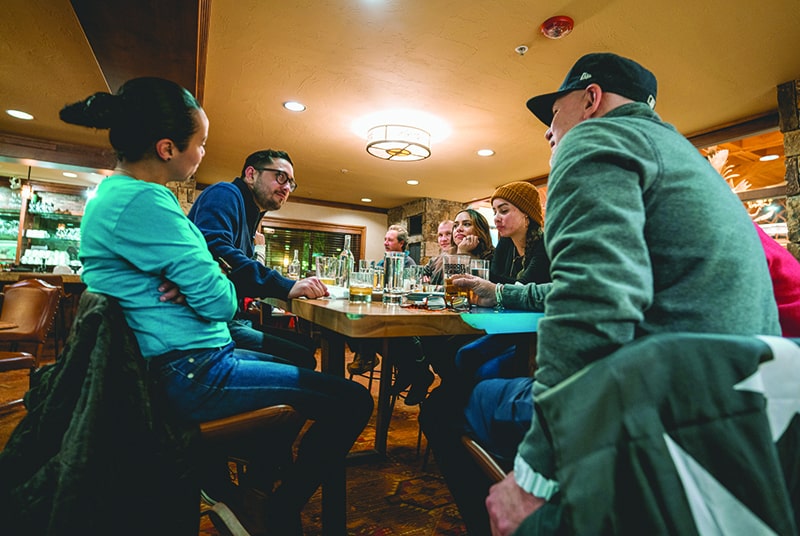
Edgar Gonzalez en la primera reunión de puertorriqueños en el parque Mike Yokel en agosto 2019. Habían 35 isleños en la fiesta y jugaban dominó, escuchaban salsa mientras admiraban a los Tetons y comían comida puertorriqueña. “Saber que he conocido a estas personas y saber que tengo una conexión inmediata con todas ellas me da la esperanza de poder crear algo similar aquí en Jackson a lo que dejé en Puerto Rico”, dice González.
EDGAR GONZALEZ SE dio a sí mismo seis meses después de graduarse de la universidad para encontrar un buen trabajo en Puerto Rico, preferiblemente uno relacionado con su bachillerato en ciencias forenses. Si esto no sucediera, expandiría su búsqueda a los Estados Unidos continentales. “Me iría de la isla”, dice. “Necesitaba ponerme de pie y hacer que mi familia se sintiera orgullosa”. Seis meses después de haberse graduado, Gonzalez, que creció en Adjuntas, un municipio de montaña cerca del centro de la isla principal, no había encontrado trabajo en Puerto Rico. Comenzó a echar una red más ancha. Al igual que Figueroa, Gonzalez vio y quedó intrigado por una oportunidad de empleo anunciada en El Nuevo Día, incluso si el trabajo estaba en servicio y no en ciencias forenses, e incluso si nunca antes había oído dónde estaba el trabajo, Wyoming.
Después de un poco de investigación, Gonzalez decidió que Jackson, Wyoming sonaba interesante. “Viniendo de las montañas de Puerto Rico, siempre seré un amante a las montañas”, dice. Él, junto con su hermano mayor, Carlos Javier Muñiz y su amiga de la infancia, Amanda Rivera (sin relación con Teresa), solicitaron al trabajo. Los tres fueron contratados y llegaron a Jackson en noviembre de 2015. Era la primera vez que Gonzalez veía nieve. Tan pronto como el trío llegó a su apartamento y Gonzalez depositó los 40 libros que había traído con él (es un lector voraz), él y Amanda salieron a hacer un muñeco de nieve.
Durante los siguientes 15 meses, Gonzalez trabajó de 7 a.m. a 12 a.m., cinco días a la semana en dos trabajos. La compañía de servicios que dirigió el anuncio que él, su hermano y Amanda solicitaron cubrieron sus vuelos de Puerto Rico a Jackson Hole, pero “nunca nos brindaron muchos de los beneficios prometidos, como el seguro médico, y nos dieron menos que el salario esperado “, dice Gonzalez. Sin embargo, se aferró a él porque era un sueldo constante y porque “con tiempo y trabajo duro, sabía que sería capaz de encontrar algo mejor”. Y así hizo; ahora es supervisor de ventas en Staples.
Gonzalez también encontró un compañero. En 2017, le propuso matrimonio a Andrés González, quien se mudó a Jackson desde Costa Rica, en Rendezvous Park con un anillo hecho de flores silvestres. Los dos se casaron poco después.
Emily Rivera, 27

Emily Rivera trabaja seis días a la semana, entre sus dos trabajos. Durante su tiempo libre limitado, ella toma mini viajes alrededor del condado de Teton y el Parque Nacional Grand Teton con su esposo o su hermana, explorando y conectando con su alrededor. Emily ama todo lo que tiene que ver con la moda. Sus cosas favoritas vienen de lo que le envía su madre a ella por correo desde Puerto Rico.
“NUNCA PENSÉ QUE me iría de Puerto Rico. Siempre pensé que sería alguien que viviría toda su vida en mi isla, cerca de mi familia “, dice Emily Rivera, la hermana menor de Amanda Rivera, quien se mudó a Jackson Hole con Edgar González en 2015.” Todo eso cambió después del huracán María”. Cuando María llegó a la isla en septiembre de 2017, Emily se había graduado recientemente de la universidad con un título en psicología infantil, con una deuda estudiantil y no había podido encontrar un trabajo que pagara lo suficiente para cubrir sus préstamos estudiantiles o tuviera algo que ver con la psicología infantil. Después de María, la situación laboral era aún peor y, varios meses después del huracán, Emily salió de la isla a vivir con varios miembros de la familia en la costa este. Después de un corto tiempo en la costa este “decidí mudarme a Jackson con mi hermana”, dice Emily.
En Jackson, Emily todavía no tiene un trabajo relacionado con su campo de estudio, pero ha tenido trabajos que pagaron lo suficiente como para permitirle pagar sus préstamos estudiantiles. (Ella hizo su pago final el febrero pasado). Y tiene a su hermana Amanda, y también a su esposo, Nikola Naumovski, quien se mudó a Jackson desde Macedonia. Naumovski y Emily se conocieron en Teton Village, donde Naumovski trabaja para Four Seasons. Emily dice que ella y Naumovski tuvieron una conexión instantánea y profunda. Se comprometieron poco después de conocerse y se casaron en la primavera de 2019. “Sé que volveré a Puerto Rico algún día, pero por ahora, tengo mucho de qué estar agradecida en Jackson”, dice.
Caribbean Cowboys
A depressed economy and natural disasters have persuaded more than 400,000 Puerto Ricans to leave their Caribbean island home since 2017. Some are making new lives for themselves in Jackson Hole.
Story and Photography by Lina Collado García

IN PUERTO RICO—an archipelago in the northeast Caribbean Sea about 1,000 miles southeast of Miami, Florida—instead of being asked “Do you ski?” a common question is “Do you surf?” The Commonwealth of Puerto Rico, a U.S. Territory since 1898, has over 143 islands, cays, islets, and atolls; today only three are inhabited—Puerto Rico, Vieques, and Culebra. When Christopher Columbus arrived in Puerto Rico in 1493, the indigenous Taínos lived on all 143 islands, plus on nearby islands including Jamaica, Cuba, and the Dominican Republic. By the end of the 16th century, the Taínos had slowly succumbed to infectious diseases brought by Europeans, war, and exploitation by Spanish settlers—Puerto Rico was a key part of the Spanish Empire from the 16th century through most of the 19th. (The Taínos were not completely extirpated: a 2011 study of people born in the commonwealth found that, on average, a Puerto Rican is 15 percent Taíno, 21 percent African, and about 64 percent European.)
Spanish is Puerto Rico’s main language, San Juan its capital, and salsa its music. The commonwealth’s population—3.2 million—is about five times greater than that of Wyoming. If Puerto Rico’s population density was ranked alongside those of the fifty U.S. states, it would be in the top five (Wyoming ranks 49th on this list). The island’s average annual temperature is almost forty degrees warmer than Jackson Hole’s and the average elevation is about 5,500 feet lower. The main island is only about 20 percent bigger in landmass than Teton County. Wyoming’s state flag features a bison. Most Puerto Ricans would say the animal that best symbolizes their islands are tiny coquí frogs, several species of which are endemic.
The distance and differences between Jackson Hole and Puerto Rico explain why, as recently as 2013, there were only five Puerto Ricans living in Jackson Hole, Wyoming, and Teton Valley, Idaho, combined (and only 33 Puerto Ricans in all of Wyoming, according to the Center for Puerto Rican Studies at Hunter College in New York City). In 2016, when the island’s debt was more than $70 billion and the economy fell even deeper into recession than it had been in for the prior decade, about 7,500 people were leaving every month. Then came Hurricanes Irma and María. Between 2017, when the hurricanes hit, and 2019, an estimated 14 percent of Puerto Rico’s population, or nearly half a million people, left for the U.S. mainland.
Puerto Ricans are as free to move to Wyoming as any other U.S. citizens, but those leaving the islands typically join friends or family in the diaspora concentrated primarily on the East Coast. Until recently, that is. Now more than 200 Puerto Ricans call Teton County home, according to the Federal Emergency Management Agency (FEMA).
The dislocation the islanders might feel upon arriving in Jackson Hole is partially mitigated by the area’s large Spanish-speaking population: about 25 percent of the Town of Jackson’s population is Hispanic, with the largest number coming from Mexico. Still, there are geographic, geologic, meteorological, and cultural differences to contend with. “Getting used to having to wear so many clothes during winter, not seeing the sun sometimes for three days straight, or not being able to dance salsa anywhere in town except for one bar, once a week, took determination,” says Teresa Rivera, who moved to Jackson in 2017. “But I’m making it work.”
Meet Rivera and some of the other Puerto Ricans making new homes and lives for themselves in a landscape that is almost as different from their homeland as the moon.
The Klein Family, Andy, 41, Nastassia Cruz, 34, Michael “Mickey,” 11, and Odie, 6

The Klein family moved to Jackson in 2017 looking for a different pace from what they left behind in Puerto Rico. Cruz says, “Very slowly, we are creating a home for ourselves and our kids. We’ve slowly added furniture, plants, and our children have their own rooms and their own space. We established a weekly routine of being home, playing games, and cooking dinner together.” Every weekend night they play a game together like dominoes, a favorite game in Puerto Rico.
NASTASSIA CRUZ WAS a recent high school graduate living with family in her hometown of Aguadilla when she met Andy Klein, an athletic outdoorsman who had recently moved to Puerto Rico from Jackson Hole. Klein spoke Spanish fluently and loved to cook, and he and Cruz quickly became involved. Eventually they opened a successful Thai restaurant in Aguadilla, One Ten Thai. They had a son, Mickey, in 2008, and got married in 2012. They celebrated the latter for one month with parties in both Jackson Hole and Puerto Rico. At that time, Cruz had been to Jackson several times with Klein and says she “felt a connection to this beautiful place.” They got married at Flat Creek Ranch.
By the spring of 2017, the Kleins made what they describe as an “easy decision” for the four of them—daughter Odie was born in 2014—to spend that summer in Jackson. They would return to Puerto Rico and One Ten Thai in October. But Hurricane María hit the island in September, and within two weeks they realized there was little to return home to. The family considered California, Colorado, and Jackson before deciding to try one winter in Jackson. “We wanted our kids to learn how to ski, and [to] find housing,” Klein says. Finding housing was more difficult than getting the kids skiing, but not by much. By the end of the winter they had moved three times and were only able to afford skiing thanks to local nonprofits like Teton Literacy Center and Coombs Outdoors (created in honor of the late skier Doug Coombs, the organization strives to empower youth to reach their potential through involvement in outdoor recreation). “Even if our decision to stay in Jackson felt easy, the experience of staying in Jackson was becoming very hard for us,” Klein says. “We constantly had to keep our heads up to show the kids we were making it; but in reality, we were going through a very hard time.” So was Odie, who couldn’t understand why they moved so much and lived with strangers when they had a house in Puerto Rico. “Every day for four months, [she] asked when we were going back home,” says Klein.
“Even if our decision to stay in Jackson felt easy,
the experience of staying in Jackson was becoming
very hard for us.”
— Andy Klein
The bright light of their move was seeing how much Mickey loved Wilson Elementary School. After his first day of school he announced that he wanted to graduate elementary school there. It was actually Mickey and Wilson Elementary that had kept the family here. Cruz and Klein say that during their first couple of years in the valley they regretted “many times” the decision to stay, but what kept them from leaving was watching Mickey thrive at and love his school.
Skiing has replaced snorkeling as the kids’ favorite activity and Klein is back in a restaurant kitchen, as executive chef at the Whistling Grizzly, which is inside the Wyoming Inn. There Klein has created a menu of “Latin-inspired cowboy cuisine” that includes mofongo (mashed green plantains, vegetables, rice and beans, and curtido slaw), trout a la plancha (pan-seared Idaho Red Trout with a Spanish eggplant relish, served on a bed of quinoa and vegetables), and la kabocha rellena (roasted kabocha squash stuffed with quinoa, mushrooms, and roasted tomato, pepitas, and romesco). In doing this, Klein has created a gathering spot for the valley’s Puerto Ricans, and a place where locals and visitors who don’t know much about this U.S. territory’s culture can get a literal taste of it.
David Figueroa, 56

David Figueroa arrived in Jackson in December 2015, looking for better opportunities to provide for his partner and daughter back home in Puerto Rico. He works 14 hour days and often uses his one day off a week to fish and connect with nature. Figueroa prefers hand fishing, which means fishing with no rod or pole.
IT WAS HIS guitar that made David Figueroa first feel like Jackson Hole was home. “During the summer, I play guitar every day on my time off with my front door wide open to get to know my new neighbors and my new community,” says Figueroa, who moved to the valley in December 2015 and lives in the Albertsons workforce housing. “I have met people from all around the world that are starting over in a very different world than their own, just like me.”
In Puerto Rico, Figueroa lived in San Juan and made the hour-long trip to favorite fishing spots in the mountains every couple of weeks. His work delivering household cleaning and kitchen supplies to supermarkets around the island was not steady, so he applied after he saw an ad in El Nuevo Día, the territory’s largest paper, for a service-industry job with a guaranteed amount of hours every week, health insurance, and housing in Jackson Hole. He did expect the outdoorsy lifestyle of the valley, even if he had never heard of Grand Teton National Park and only knew Yellowstone through Yogi Bear and a documentary film. But he says he never imagined he would find the community he has found here.
“I have met people from all around the world that are starting over in a very different world than their own, just like me.”
Last September, using his one day off a week from his two jobs—as a butcher/clerk in the Albertsons deli and as a server at the Whistling Grizzly—Figueroa visited Yellowstone for the first time. “It blew my mind,” he says (even if he didn’t see a bear, which has long been a dream of his). More often Figueroa uses his day off to fish on Jackson Lake. “I moved to Jackson Hole for the many job opportunities, so I could afford to send money home and save, and to have better options for myself,” he says. “I have found so many other benefits: here I fish, I feel one with nature and can be present in the moment. Many people outside of Jackson do not understand [the importance of nature and being outside], but I don’t care. It is my therapy and my way to cope with what I am missing from home,” he says.
And also a way of coping with racist remarks.
One day when Figueroa was working at the Albertsons deli, a customer told him, “You need to learn English if you are going to live in this country. If I were you, I would go back.” Figueroa, who rates his English as an 8 on a scale of 1 to 10, replied that he had been a US. citizen since birth. He also showed the customer one of his most prized possessions, which he had in his wallet that day: his late father’s veteran certificate. Ladislao Figueroa received a Purple Heart in Vietnam. “It made me feel angry and frustrated that the average American doesn’t understand anything about Puerto Rico or Puerto Ricans, and that is my constant reality,” he says. Still, “I wouldn’t leave Jackson. [Here] everyone understands a walk in nature, a fishing rod, or a good baseball game. This town is a mixture of every culture I can imagine. I love that.”
Teresa Rivera, 48

Teresa Rivera moved to Jackson in 2017. At both of her jobs, as a manager at the Dollar Store and a server at San Juan Restaurant, she says she always “talks to customers about Puerto Rico, and about its amazing cuisine. Customers got so curious that I started to make everything I loved, and gave it to everyone who was interested in trying it.” Her traditional Puerto Rican eggnog, coquito, was a huge hit and Rivera now gets more than 30 orders for it every holiday season, from locals of all backgrounds.
TERESA RIVERA HAD a rough entry to living in Jackson Hole. The only housing she could find was a 600-square-foot, two-bedroom/one-bathroom apartment. She shared it with two roommates but, for several months, there were as many as five people living there. It was “a nightmare” she says. She eventually spent all of her time at the apartment in her bedroom, where she kept all of her possessions, kitchenware included, and made sure to lock the door when she wasn’t home.
Then, two months after moving here, Rivera slipped and tore two ligaments in her knee. The surgery to repair the ligaments went routinely, but a week later she developed a pulmonary embolism. A blood clot, likely formed after surgery, had lodged in an artery in her lung. Pulmonary embolisms can be life threatening, and Rivera was in the hospital for two days. She says it would have been easy to fall into a deep depression, but she didn’t thanks to her boyfriend, Luis Gil, and also help received from the community. “Thanks to people like Carmina Oaks [of the Community Resource Center], Dr. [Bruce] Hayse, and the Teton Free Clinic, I got the medication and the oxygen tanks I needed,” Rivera says. Gil, a native of the Dominican Republic who had moved to Jackson Hole a year before Rivera, supported her throughout her recovery.
Today, about three years after Rivera’s pulmonary embolism, she and Gil support each other. During a snowstorm last March, they got married. The ceremony was outside, in the backyard of a home in East Jackson. The officiant was the home’s owner, Cynthia M. Dahlin, whom Rivera first met through her job as a manager at the Dollar Store. Wedding guests included five of Rivera’s co-workers and supervisors from San Juan Restaurant, which is owned by a local Mexican-American family and where she has been a server/host for more than two years.
“I have been able to create a family here when there was none,” Rivera says. “I walk down the street and people are always interacting with me, Latinos and non-Latinos.”
“I have been able to create a family here when there was none,” Rivera says. “I walk down the street and people are always interacting with me, Latinos and non-Latinos. The non-Latinos speak to me in Spanish, to practice the language, and are always asking me about traditional Puerto Rican dishes. The Latinos ask about Puerto Rico, curious about a place they know little about. That can only happen when you are in a place with such an open community.”
Edgar Gonzalez, 29
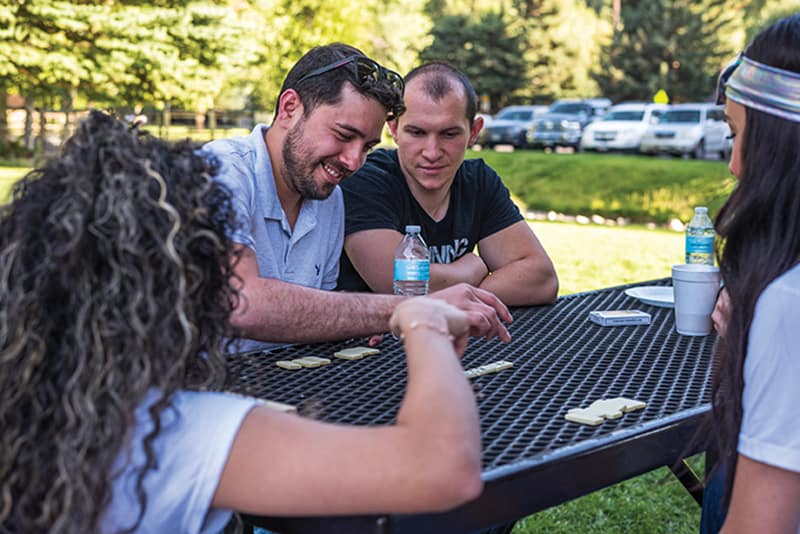
Edgar Gonzalez (middle, smiling) at the first gathering of Puerto Ricans in Jackson Hole at Mike Yokel Park last August. There were about 35 of the islanders at the party and they played dominoes, listened to salsa while admiring the Tetons, and ate Puerto Rican food. “Knowing I have met these people and knowing I have an immediate connection with all of them gives me hope of being able to create something similar here in Jackson to what I left behind in Puerto Rico,” Gonzalez says.
EDGAR GONZALEZ GAVE himself six months after graduating from college to find a good job in Puerto Rico, preferably one related to his forensic science degree. If it didn’t happen, he’d expand his search to the U.S. mainland. “I would leave the island,” says Gonzales, who grew up in Adjuntas, a mountainside municipality near the center of the main island. “I needed to stand on my own two feet and make my family proud.” Six months after graduation, Gonzalez had not found a job in Puerto Rico, so he began casting a wider net. Like Figueroa, he saw and was intrigued by an employment opportunity advertised in El Nuevo Día, even if the job was in service and not forensic science, and even if he had never before heard of the place where the job was, Wyoming.
“Coming from the mountains of Puerto Rico, I will always be a mountain lover.”
After some research, Gonzalez decided Jackson, Wyoming sounded interesting. “Coming from the mountains of Puerto Rico, I will always be a mountain lover,” he says. He, along with his older brother, Carlos Javier Muñiz, and their childhood friend, Amanda Rivera (no relation to Teresa), applied for the jobs. The three were hired and arrived in Jackson in November 2015. It was the first time Gonzalez saw snow. As soon as the trio arrived at their apartment and Gonzalez had deposited the forty-some books he had brought with him—he’s a voracious reader—he and Amanda went outside to make a snowman.
For the next 15 months, Gonzalez worked from 7 a.m. to 12 a.m., five days a week, at two jobs. The service company that ran the help-wanted ad that he, his brother, and Amanda answered did cover their flights from Puerto Rico to Jackson Hole, but “never provided us with many of the promised benefits, like health insurance, and gave us less than the expected salary,” Gonzalez says. He stuck with it though because it was a steady paycheck and because “with time and hard work, I knew I would be able to find something better.” He did; now he’s a sales supervisor at Staples.
Gonzalez also found a partner. In 2017 he proposed to Andrés González, who moved to Jackson from Costa Rica, at Rendezvous Park with a ring made from wildflowers. The two got married shortly after.
Emily Rivera, 27

Emily Rivera works six days a week between her two jobs. During her limited free time, she takes mini road trips around Teton County and Grand Teton National Park with her husband or sister, exploring and connecting with their surroundings. Emily loves anything that has to do with fashion. Her favorite things are whatever her mother sends her through their frequent mail exchange from Puerto Rico.
“I NEVER THOUGHT I would leave Puerto Rico. I thought of myself as someone who would live her entire life on my island, near my family,” says Emily Rivera, the younger sister of Amanda Rivera, who moved to Jackson Hole with Edgar Gonzalez in 2015. “All of that changed after Hurricane María.” When María hit the island in September 2017 Emily was a recent college grad with a degree in child psychology and significant student debt. She had been unable to find a job that paid enough to cover her student loans or had anything to do with child psychology. Post-María, the job situation became even worse, and within several months of the hurricane, Emily left the island to live with several family members on the mainland East Coast. After a short time there, she says, “I decided to move to Jackson with my sister.”
“I know I will return to Puerto Rico one day, but for now, I have a lot to be grateful about in Jackson.”
In Jackson Emily still doesn’t have a job related to her field of study, but she has had jobs that allowed her to pay off her student loans. (She made her final payment last February.) And she has her sister Amanda, and now also a husband, Nikola Naumovski, who moved to Jackson from Macedonia. Naumovski and Emily met in Teton Village, where Naumovski works at the Four Seasons Resort. Emily says she and Naumovski had an instant and deep connection; they got engaged shortly after meeting and married in the spring of 2019.
“I know I will return to Puerto Rico one day, but for now, I have a lot to be grateful about in Jackson,” she says. JH

